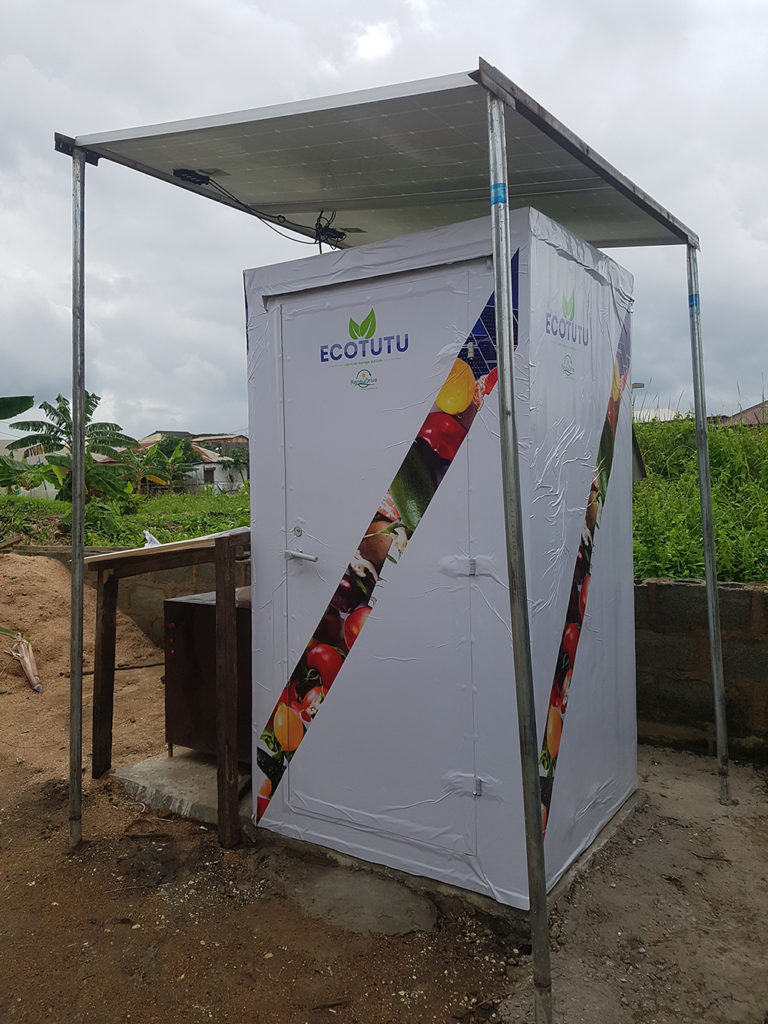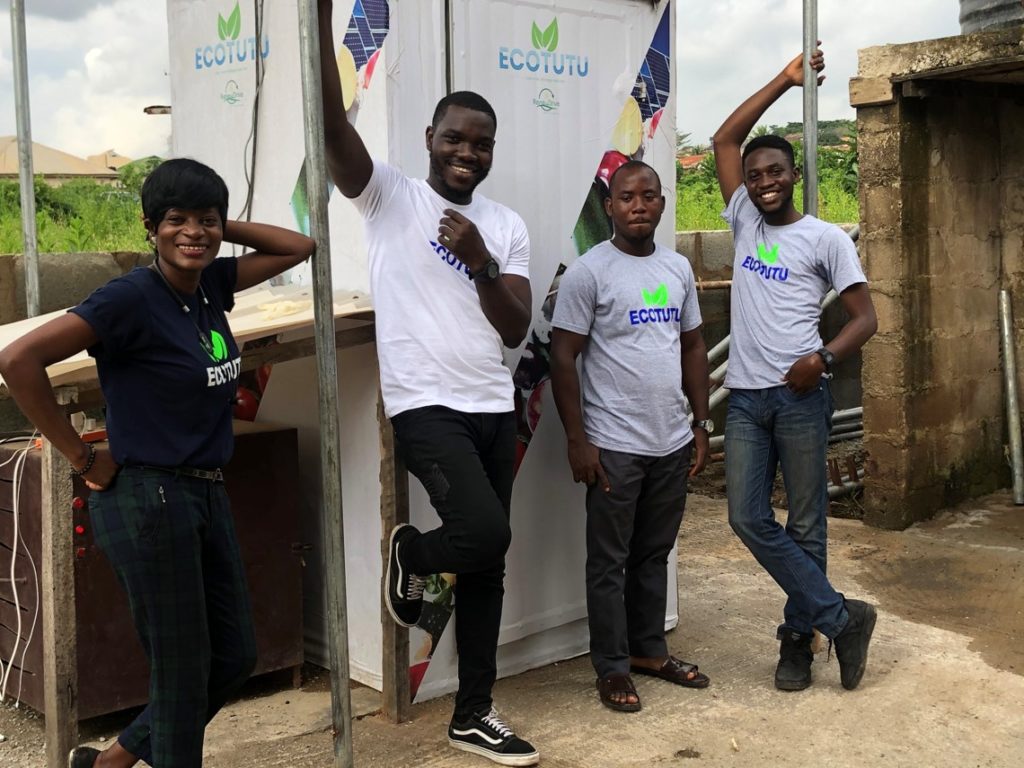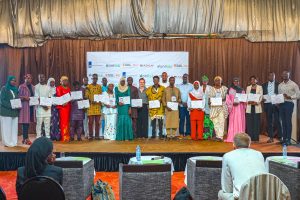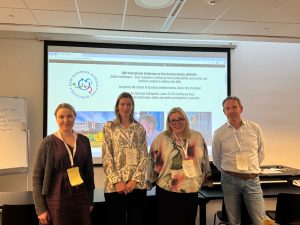My team is committed to provide access to clean and affordable cold chain solutions, while creating a profitable and sustainable business that increases local employment and improves environmental wellness
The agricultural sector is the principal driving force of the African economy, securing employment for two thirds of the continent’s working population. However, 45% of the total food production in Africa is spoiled due to lack of cold storage. Babajide Oluwase, co-founder and Growth Lead of Ecotutu, mitigates the problem of food waste: he delivers 100% solar-powered cold storage to farmers and food vendors in Nigeria in order to sustainably secure the food chain. Orange Corners HQ asked about Babajide’s motivation for building his own technology startup and how Orange Corners helped him with further boosting his business.
What drove you to build your own startup in Nigeria?
“Since I was little, I have been engaged and interested in environmental work. But it wasn’t until my second year in the university that I came in contact with like-minded peers that were looking for solutions to waste less, recycle more and improve livelihoods. I was involved in advocacy and sensitisation programs to educate primarily the younger population on what we can do to combat and prevent climate change issues.
My interest in community work gradually increased over the years, facing several environmental problems including food waste. Realising the gaps pursuing to exist in the food value chain in Nigeria, my team is committed to provide access to clean and affordable cold chain solutions, while creating a profitable and sustainable business that increases local employment and improves environmental wellness. Our principal aim is to tackle the gaps existing between preservation and transportation from farm gates to the market place through refrigeration of agricultural products, anticipating that consumers buy the products in the same shape and state as producers harvested it.”
Once you are dedicated to create direct local impact and you have found like-minded business go-getters, the journey has only just begun
When and how did you get into the Orange Corners programme?
“Ecotutu applied in August 2020 for the Orange Corners programme, whilst being in the middle of the lockdown. The quarantine urged us to re-evaluate how we could enhance our core competencies, while continuously building new compelling solutions to the problems that exist in Nigeria and across Africa.
Through the programme, we were able to better understand and solidify our business model, by working closely with a structured legal and financial advisor. We now have a better understanding of our business and the market, allowing us to better address and solve the problem: preserving perishables and transporting temperature-sensitive items without the need for non-stop power supply. In this regard, agriculturally-oriented businesses can continue functioning without worrying that their production will go to waste.
We grew from a 5-person team before the programme to a 10-person team after the programme and we are keen to expand our team. The past three years have been quite a journey for Ecotutu, but we are an assembly of dedicated workers. What really motivates us is how much value we are able to generate value until now.”
Could you tell us how you came up with the name Ecotutu?

“We started with the name Ecobox. But it wasn’t until we gained international attention we changed the name to Ecotutu, with “tutu” coined from the Yorúba language, meaning something ‘cold’ or ‘chilling’. Beyond enabling access to a cold box, we are working to provide viable cold storage solutions for businesses in rural and urban communities on a long-term basis. We constantly try to listen to our customers to create more affordable new product lines while partnering with businesses with similar objectives. Collectively, we wish to improve food storage, promote environmental awareness and encourage food sustainability. “
The potential to increase food security in Africa is tremendous and the continent needs it now more than ever, especially with the predicted growth in population ahead of us, estimably around 2.5 billion by 2050.
“Producing more food to compensate for the products that go to waste will only widen the food insecurity gap for current and future population. Our objective is not only to accelerate access to last-mile cooling technology in emerging markets by offering reliable and affordable cold storage facilities, but also to educate businesses on how to bridge the food security gap and secure their agricultural products sustainably. “
Where would you see Ecotutu in five years?
“We hope to deploy even more cold storage solutions and capture a significant share of the Nigerian market, eventually aiming to operate in other African countries. There is already a growing interest in Ghana, Uganda, Rwanda and Ivory Coast and we are geared to pursue those opportunities. In doing so, we are certain to create more jobs for women and youth, to improve technological access for the largely underserved communities and to grow the local economy. The potential to increase food security in Africa is tremendous and the continent needs it now more than ever, especially with the predicted growth in population ahead of us, estimably around 2.5 billion by 2050. This is a great incentive for Ecotutu to continue what we do. Don’t be surprised if in a couple of years you see solar-powered refrigerated trucks by Ecotutu transport food across the African continent! “

Our aim is to tackle the gaps existing between preservation and transportation from farm gates to the market place through refrigeration of agricultural products, in the hope that that consumers buy the products in the same shape and state as producers harvested it.
What other advice would you give aspiring or current entrepreneurs?
“Some days can be tiring or demotivating, but noticing how much improvement and growth we have created for the sake of others, is what keeps us going. I would say to current and aspiring entrepreneurs; try to understand the real problem you set out to address. Is the problem concrete enough? Do you have the tools and know-how in place to solve these problems and if not, how will you find the startups tools to educate yourself? Is there a market for the solution you want to solve? While asking others for business help and assistance, remind yourself that a certain level of flexibility, focus and open-mindedness is necessary to keep on innovating, collaborating and growing. Once you are dedicated to create direct local impact and you have found like-minded business go-getters, the journey has only just begun!”
Find out more about Babajide’s start-up and his team on www.ecotutu.com





